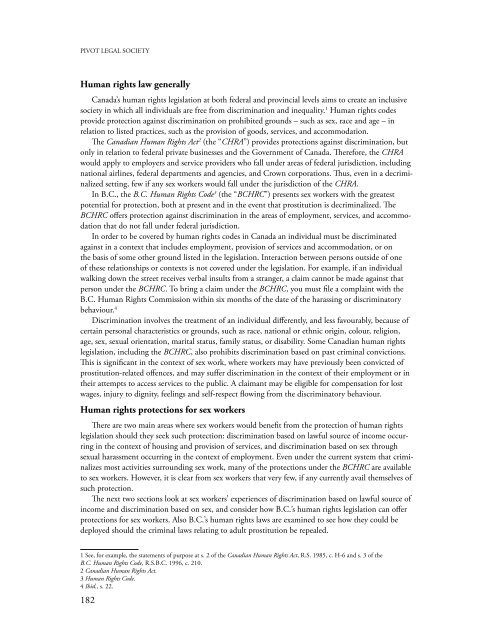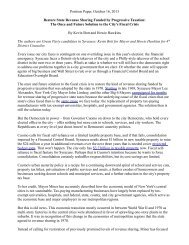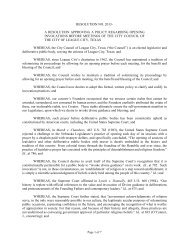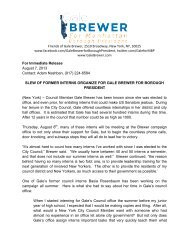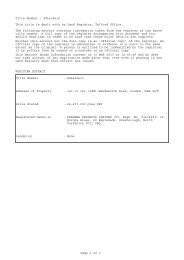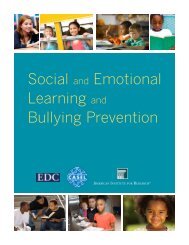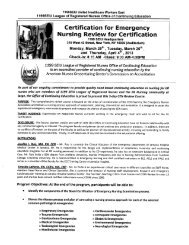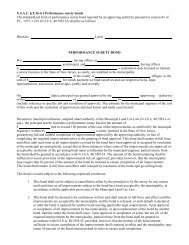PIVOT LEGAL SOCIETY<strong>Human</strong> rights law generallyCanada’s human rights legislation at both federal <strong>and</strong> provincial levels aims to create an inclusivesociety in which all individuals are free from discrimination <strong>and</strong> inequality. <strong>Human</strong> rights codesprovide protection against discrimination on prohibited grounds – such as sex, race <strong>and</strong> age – inrelation to listed practices, such as the provision of goods, services, <strong>and</strong> accommodation.The Canadian <strong>Human</strong> <strong>Rights</strong> Act (the “CHRA”) provides protections against discrimination, butonly in relation to federal private businesses <strong>and</strong> the Government of Canada. Therefore, the CHRAwould apply to employers <strong>and</strong> service providers who fall under areas of federal jurisdiction, includingnational airlines, federal departments <strong>and</strong> agencies, <strong>and</strong> Crown corporations. Thus, even in a decriminalizedsetting, few if any sex <strong>work</strong>ers would fall under the jurisdiction of the CHRA.In B.C., the B.C. <strong>Human</strong> <strong>Rights</strong> Code (the “BCHRC”) presents sex <strong>work</strong>ers with the greatestpotential for protection, both at present <strong>and</strong> in the event that prostitution is decriminalized. TheBCHRC offers protection against discrimination in the areas of employment, services, <strong>and</strong> accommodationthat do not fall under federal jurisdiction.In order to be covered by human rights codes in Canada an individual must be discriminatedagainst in a context that includes employment, provision of services <strong>and</strong> accommodation, or onthe basis of some other ground listed in the legislation. Interaction between persons outside of oneof these relationships or contexts is not covered under the legislation. For example, if an individualwalking down the street receives verbal insults from a stranger, a claim cannot be made against thatperson under the BCHRC. To bring a claim under the BCHRC, you must file a complaint with theB.C. <strong>Human</strong> <strong>Rights</strong> Commission within six months of the date of the harassing or discriminatorybehaviour. Discrimination involves the treatment of an individual differently, <strong>and</strong> less favourably, because ofcertain personal characteristics or grounds, such as race, national or ethnic origin, colour, religion,age, sex, sexual orientation, marital status, family status, or disability. Some Canadian human rightslegislation, including the BCHRC, also prohibits discrimination based on past criminal convictions.This is significant in the context of sex <strong>work</strong>, where <strong>work</strong>ers may have previously been convicted ofprostitution-related offences, <strong>and</strong> may suffer discrimination in the context of their employment or intheir attempts to access services to the public. A claimant may be eligible for compensation for lostwages, injury to dignity, feelings <strong>and</strong> self-respect flowing from the discriminatory behaviour.<strong>Human</strong> rights protections for sex <strong>work</strong>ersThere are two main areas where sex <strong>work</strong>ers would benefit from the protection of human rightslegislation should they seek such protection: discrimination based on lawful source of income occurringin the context of housing <strong>and</strong> provision of services, <strong>and</strong> discrimination based on sex throughsexual harassment occurring in the context of employment. Even under the current system that criminalizesmost activities surrounding sex <strong>work</strong>, many of the protections under the BCHRC are availableto sex <strong>work</strong>ers. However, it is clear from sex <strong>work</strong>ers that very few, if any currently avail themselves ofsuch protection.The next two sections look at sex <strong>work</strong>ers’ experiences of discrimination based on lawful source ofincome <strong>and</strong> discrimination based on sex, <strong>and</strong> consider how B.C.’s human rights legislation can offerprotections for sex <strong>work</strong>ers. Also B.C.’s human rights laws are examined to see how they could bedeployed should the criminal laws relating to adult prostitution be repealed. See, for example, the statements of purpose at s. 2 of the Canadian <strong>Human</strong> <strong>Rights</strong> Act, R.S. 1985, c. H-6 <strong>and</strong> s. 3 of theB.C. <strong>Human</strong> <strong>Rights</strong> Code, R.S.B.C. 1996, c. 210. Canadian <strong>Human</strong> <strong>Rights</strong> Act. <strong>Human</strong> <strong>Rights</strong> Code. Ibid., s. 22.182
BEYOND DECRIMINALIZATION: <strong>Sex</strong> Work, <strong>Human</strong> <strong>Rights</strong> <strong>and</strong> a <strong>New</strong> Frame<strong>work</strong> for Law ReformDiscrimination based on source of incomeExperiences of discrimination in housingThe BCHRC prohibits l<strong>and</strong>lords from discriminating against potential renters on the basis of aperson’s lawful source of income. However, this section offers only limited protection to sex <strong>work</strong>ers,many of whom described difficulty finding housing due to discrimination based on their source ofincome.Q. Okay, [name omitted], you mentioned housing, do you want to talk a little bit aboutthat?A. There should be some organizations that take care of just strictly housing. Have listsof housing, apartments. That when you are leaving the sex trade, you don’t have togo through all this rigmarole of references <strong>and</strong> nah-nah-nah. You just kinda provenyourself by getting that far <strong>and</strong> they should be there should be some places that canlead you on to good housing.A. Well the thing that . . .A. Because that’s the number one importance when you leave, is the housing.A. Well the thing is too, is like, even – even if it’s decriminalized, people are still gonnabe people that are always gonna look at you as lower class. And there always gonnabe people who discriminate against more jobs, or housing. I mean, I’ve been turnedaway <strong>and</strong> not because it’s illegal, but because they have moral issues with it. Oh, wellwe don’t want you here. We won’t rent to you. We won’t this, we won’t that, right? SoI mean, even if it’s legalized, you are still going to have, people are still gonna.- female street-level sex <strong>work</strong>ersMany sex <strong>work</strong>ers reported that l<strong>and</strong>lords refuse to rent to sex <strong>work</strong>ers. In order to be protected fromdiscrimination in the housing market on the basis of their source of income, sex <strong>work</strong>ers must firstestablish that their source of income is lawful.Section 10(1) of the BCHRC prohibits l<strong>and</strong>lords from discriminating against tenants because oftheir “lawful source of income.” This means l<strong>and</strong>lords cannot refuse to rent to someone, or imposeunfavourable terms on their tenancy agreement on the basis of their lawful source of income. Thisground has been applied to protect people receiving social assistance from such discrimination, buthas not yet been applied to other types of wage earners, including sex <strong>work</strong>ers.The requirement that the source of income be lawful creates an added barrier for sex <strong>work</strong>ers.Currently, the sale of sex between consenting adults is legal under Canadian law. However, certainactivities associated with sex <strong>work</strong> are criminalized under s.s 210 to 213 of the Criminal Code. Manyestablishments that currently offer both sexual services <strong>and</strong> non-sexual services are legally licensed;their <strong>work</strong> can be described as both legal <strong>and</strong> illegal under Canadian law. On this basis, depending onthe circumstances of the case, it may be possible for some persons employed in such establishments tosuccessfully argue that they are lawfully employed for the purposes of making a human rights claimunder s. 10(1). For example, an employee of a licensed massage parlour, depending on the particularfacts in evidence, could make a valid argument that they are lawfully employed. However, based onthe available information, it appears that such an argument has never been made before the B.C.<strong>Human</strong> <strong>Rights</strong> Tribunal. After the criminal laws are repealed, sex <strong>work</strong>ers would enjoy full protectionunder s. 10(1) of the B.C. <strong>Human</strong> <strong>Rights</strong> Code against discrimination in renting tenancy premises, asthere <strong>work</strong> would be fully “legal.” See, for example, Neale v. Princeton Place Apts. Ltd. (2001), B.C.H.R.T. 6 <strong>and</strong> Tanner v. Vlake (2003), B.C.H.R.T. 36.183
- Page 4:
PIVOT LEGAL SOCIETYPart 2: Municipa
- Page 21 and 22:
BEYOND DECRIMINALIZATION: Sex Work,
- Page 23 and 24:
BEYOND DECRIMINALIZATION: Sex Work,
- Page 25 and 26:
BEYOND DECRIMINALIZATION: Sex Work,
- Page 27 and 28:
BEYOND DECRIMINALIZATION: Sex Work,
- Page 29 and 30:
BEYOND DECRIMINALIZATION: Sex Work,
- Page 31 and 32:
BEYOND DECRIMINALIZATION: Sex Work,
- Page 33 and 34:
BEYOND DECRIMINALIZATION: Sex Work,
- Page 35 and 36:
BEYOND DECRIMINALIZATION: Sex Work,
- Page 37 and 38:
BEYOND DECRIMINALIZATION: Sex Work,
- Page 39 and 40:
BEYOND DECRIMINALIZATION: Sex Work,
- Page 41 and 42:
BEYOND DECRIMINALIZATION: Sex Work,
- Page 43 and 44:
BEYOND DECRIMINALIZATION: Sex Work,
- Page 45 and 46:
BEYOND DECRIMINALIZATION: Sex Work,
- Page 47 and 48:
BEYOND DECRIMINALIZATION: Sex Work,
- Page 49 and 50:
BEYOND DECRIMINALIZATION: Sex Work,
- Page 51 and 52:
BEYOND DECRIMINALIZATION: Sex Work,
- Page 53 and 54:
BEYOND DECRIMINALIZATION: Sex Work,
- Page 55 and 56:
BEYOND DECRIMINALIZATION: Sex Work,
- Page 57 and 58:
BEYOND DECRIMINALIZATION: Sex Work,
- Page 59 and 60:
BEYOND DECRIMINALIZATION: Sex Work,
- Page 61 and 62:
BEYOND DECRIMINALIZATION: Sex Work,
- Page 63 and 64:
BEYOND DECRIMINALIZATION: Sex Work,
- Page 65 and 66:
BEYOND DECRIMINALIZATION: Sex Work,
- Page 67 and 68:
BEYOND DECRIMINALIZATION: Sex Work,
- Page 69 and 70:
BEYOND DECRIMINALIZATION: Sex Work,
- Page 71 and 72:
BEYOND DECRIMINALIZATION: Sex Work,
- Page 73 and 74:
BEYOND DECRIMINALIZATION: Sex Work,
- Page 75 and 76:
BEYOND DECRIMINALIZATION: Sex Work,
- Page 77 and 78:
BEYOND DECRIMINALIZATION: Sex Work,
- Page 79 and 80:
BEYOND DECRIMINALIZATION: Sex Work,
- Page 81 and 82:
BEYOND DECRIMINALIZATION: Sex Work,
- Page 83 and 84:
BEYOND DECRIMINALIZATION: Sex Work,
- Page 85 and 86:
BEYOND DECRIMINALIZATION: Sex Work,
- Page 87 and 88:
BEYOND DECRIMINALIZATION: Sex Work,
- Page 89 and 90:
BEYOND DECRIMINALIZATION: Sex Work,
- Page 91 and 92:
BEYOND DECRIMINALIZATION: Sex Work,
- Page 93 and 94:
BEYOND DECRIMINALIZATION: Sex Work,
- Page 95 and 96:
BEYOND DECRIMINALIZATION: Sex Work,
- Page 97 and 98:
BEYOND DECRIMINALIZATION: Sex Work,
- Page 99 and 100:
BEYOND DECRIMINALIZATION: Sex Work,
- Page 101 and 102:
BEYOND DECRIMINALIZATION: Sex Work,
- Page 103 and 104:
BEYOND DECRIMINALIZATION: Sex Work,
- Page 105 and 106:
BEYOND DECRIMINALIZATION: Sex Work,
- Page 107 and 108:
BEYOND DECRIMINALIZATION: Sex Work,
- Page 109 and 110:
BEYOND DECRIMINALIZATION: Sex Work,
- Page 111 and 112:
BEYOND DECRIMINALIZATION: Sex Work,
- Page 113 and 114:
BEYOND DECRIMINALIZATION: Sex Work,
- Page 115 and 116:
BEYOND DECRIMINALIZATION: Sex Work,
- Page 117 and 118:
BEYOND DECRIMINALIZATION: Sex Work,
- Page 119 and 120:
BEYOND DECRIMINALIZATION: Sex Work,
- Page 121 and 122:
BEYOND DECRIMINALIZATION: Sex Work,
- Page 123 and 124:
BEYOND DECRIMINALIZATION: Sex Work,
- Page 125 and 126:
BEYOND DECRIMINALIZATION: Sex Work,
- Page 127 and 128:
BEYOND DECRIMINALIZATION: Sex Work,
- Page 129 and 130:
BEYOND DECRIMINALIZATION: Sex Work,
- Page 131 and 132: BEYOND DECRIMINALIZATION: Sex Work,
- Page 133 and 134: BEYOND DECRIMINALIZATION: Sex Work,
- Page 135 and 136: BEYOND DECRIMINALIZATION: Sex Work,
- Page 137 and 138: BEYOND DECRIMINALIZATION: Sex Work,
- Page 139 and 140: BEYOND DECRIMINALIZATION: Sex Work,
- Page 141 and 142: BEYOND DECRIMINALIZATION: Sex Work,
- Page 143 and 144: BEYOND DECRIMINALIZATION: Sex Work,
- Page 145 and 146: BEYOND DECRIMINALIZATION: Sex Work,
- Page 147 and 148: BEYOND DECRIMINALIZATION: Sex Work,
- Page 149 and 150: BEYOND DECRIMINALIZATION: Sex Work,
- Page 151 and 152: BEYOND DECRIMINALIZATION: Sex Work,
- Page 153 and 154: BEYOND DECRIMINALIZATION: Sex Work,
- Page 155 and 156: BEYOND DECRIMINALIZATION: Sex Work,
- Page 157 and 158: BEYOND DECRIMINALIZATION: Sex Work,
- Page 159 and 160: BEYOND DECRIMINALIZATION: Sex Work,
- Page 161 and 162: BEYOND DECRIMINALIZATION: Sex Work,
- Page 163 and 164: BEYOND DECRIMINALIZATION: Sex Work,
- Page 165 and 166: BEYOND DECRIMINALIZATION: Sex Work,
- Page 167 and 168: BEYOND DECRIMINALIZATION: Sex Work,
- Page 169 and 170: BEYOND DECRIMINALIZATION: Sex Work,
- Page 171 and 172: BEYOND DECRIMINALIZATION: Sex Work,
- Page 173 and 174: BEYOND DECRIMINALIZATION: Sex Work,
- Page 175 and 176: BEYOND DECRIMINALIZATION: Sex Work,
- Page 177 and 178: BEYOND DECRIMINALIZATION: Sex Work,
- Page 179 and 180: BEYOND DECRIMINALIZATION: Sex Work,
- Page 181: BEYOND DECRIMINALIZATION: Sex Work,
- Page 185 and 186: BEYOND DECRIMINALIZATION: Sex Work,
- Page 187 and 188: BEYOND DECRIMINALIZATION: Sex Work,
- Page 189 and 190: BEYOND DECRIMINALIZATION: Sex Work,
- Page 191 and 192: BEYOND DECRIMINALIZATION: Sex Work,
- Page 193 and 194: BEYOND DECRIMINALIZATION: Sex Work,
- Page 195 and 196: BEYOND DECRIMINALIZATION: Sex Work,
- Page 197 and 198: BEYOND DECRIMINALIZATION: Sex Work,
- Page 199 and 200: BEYOND DECRIMINALIZATION: Sex Work,
- Page 201 and 202: BEYOND DECRIMINALIZATION: Sex Work,
- Page 203 and 204: BEYOND DECRIMINALIZATION: Sex Work,
- Page 205 and 206: BEYOND DECRIMINALIZATION: Sex Work,
- Page 207 and 208: BEYOND DECRIMINALIZATION: Sex Work,
- Page 209 and 210: BEYOND DECRIMINALIZATION: Sex Work,
- Page 211 and 212: BEYOND DECRIMINALIZATION: Sex Work,
- Page 213 and 214: BEYOND DECRIMINALIZATION: Sex Work,
- Page 215 and 216: BEYOND DECRIMINALIZATION: Sex Work,
- Page 217 and 218: BEYOND DECRIMINALIZATION: Sex Work,
- Page 219 and 220: BEYOND DECRIMINALIZATION: Sex Work,
- Page 221 and 222: BEYOND DECRIMINALIZATION: Sex Work,
- Page 223 and 224: BEYOND DECRIMINALIZATION: Sex Work,
- Page 225 and 226: BEYOND DECRIMINALIZATION: Sex Work,
- Page 227 and 228: BEYOND DECRIMINALIZATION: Sex Work,
- Page 229: BEYOND DECRIMINALIZATION: Sex Work,


